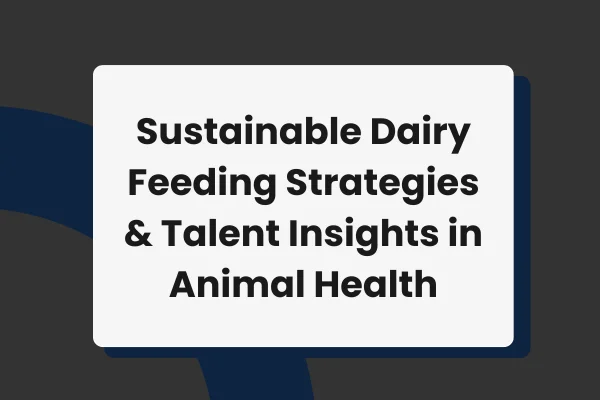
Sustainability is reshaping the animal health and nutrition sector. Research into sustainable dairy feeding strategies, such as reducing methane emissions, is not only driving farm practices but also influencing the skills and talent companies require. These innovations underscore the increasing importance of recruitment strategies that balance scientific expertise with commercial needs.
Dr. Antonio Faciola’s work at the University of Florida demonstrates how targeted dietary interventions can reduce methane emissions in dairy production without compromising animal performance. These findings illustrate how sustainability and nutrition are converging, and how businesses must adapt their recruitment and talent strategies to stay competitive.
Scientific Innovation and Recruitment Implications
Methane emissions from dairy cattle pose a significant challenge to sustainability. Dr. Faciola’s research focuses on protected fats and other feed supplements that can modify rumen fermentation. These interventions reduce methane output while maintaining fibre digestion, offering clear environmental and efficiency benefits.
From a recruitment perspective, this innovation creates demand for specialists who can translate scientific research into practical applications. Roles in feed formulation, animal nutrition, regulatory compliance, and product development are expanding. Job seekers with skills in ruminant physiology, feed science, and sustainability are increasingly in demand.
From Research to Commercialisation: Emerging Roles
Dr. Faciola’s studies show that novel fat supplements can lower methane by approximately 20 per cent in controlled conditions. Bringing these strategies from laboratory to farm requires professionals with expertise in trial design, regulatory affairs, and data interpretation.
Employers are seeking candidates who can bridge research and commercial implementation. Positions in technical transfer, sustainability program management, and farm-level product validation are becoming key. Professionals with experience in both scientific research and practical application are well-positioned to advance in this sector.
Sustainability Goals and Hiring Priorities
Sustainability targets are influencing organisational hiring strategies. Companies are recruiting nutritionists, feed scientists, and regulatory specialists to meet methane reduction goals. Roles that integrate sustainability metrics, lifecycle assessment, and compliance oversight are increasingly essential.
For candidates, combining technical expertise with a clear understanding of sustainability objectives enhances employability. Professionals who can contribute to both operational efficiency and environmental performance are in high demand across animal health and nutrition companies.
Industry Collaboration and Cross-Functional Skills
Feeding innovation requires collaboration between researchers, commercial companies, regulators, and farmers. Recruitment strategies are evolving to prioritise professionals with cross-functional experience, strong communication skills, and the ability to translate complex science to practical applications.
Candidates with experience in collaborative projects or partnerships, whether in R&D, regulatory, or commercial functions, have a competitive edge. The ability to work across disciplines is becoming a core competency in sustainable feeding and animal nutrition.
Future Talent Trends in Sustainable Feeding
As research on sustainable dairy feeding strategies moves toward commercialisation, new roles will continue to emerge. Large-scale trials, regulatory approvals, and market adoption will drive demand for talent in R&D, operations, regulatory affairs, and commercial teams.
Companies that anticipate these changes and invest in multidisciplinary talent will be better positioned to bring innovations to market. Professionals with skills in sustainability-focused feed strategies, regulatory knowledge, and commercial acumen will find expanding opportunities in this evolving sector.
Sustainable dairy feeding strategies, including Dr. Faciola’s research on methane reduction, are reshaping the animal health and nutrition sector. These innovations influence recruitment, highlighting the need for multidisciplinary talent that can drive innovation from research to farm implementation.
Companies and professionals navigating this evolving landscape require insight into emerging roles and skills. For specialised recruitment expertise and support in the animal health and nutrition sector, visit our Animal Health and Nutrition page.




